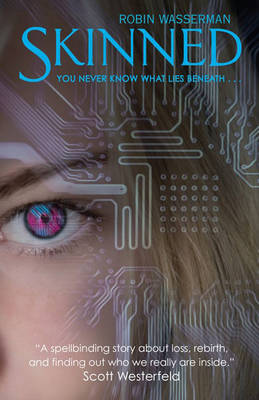Reviewed by Amber (The Literary Phoenix) on
So Skinned tells the story of Lia Khan. Lia is dead. Lia is alive. That’s the paradox makes up conflict in this book as Lia learns to navigate the world in her postmortem existence. This isn’t much of a spoiler, since this is the premise of the book itself, but in the first pages of Skinned, Lia dies. The beginning of the book is about Lia booting on – her brain has been sliced and micro-scanned and approved for transplant into a machine to preserve her after death. As a minor, Lia has no say in the process and since her death was unexpected, she doesn’t get a custom model – she is uploaded into a base model that barely resembles her.
That’s the premise of Skinned. Lia’s own reactions and those of the people around her are what follow. Is she a miracle or abomination? Can she pick up her life where she left it? She faces what it is like to have a human mind and emotions but not be organic. And are her memories true, or are they computer programming? … There’s a lot to unpack here and I find it absolutely fascinating and wholeheartedly recommend it. Dystopias come in many shapes and sizes, but a lot of them are about government upheaval. I find dystopian futures that discuss philosophical concepts so interesting. What does it mean to be alive? Where is the moral line of creating life?
The characters themselves are okay. Because I’ve read the whole trilogy before, I know they get better, but in this first book Lia, Zo, Jude, and Austen are all a bit flat. Jude and Austen, two different ends of the spectrum, serve to push Lia and grow her character… and Lia is flat because she is discovering herself and unwinding the threads between who she was and who she is. And Zoie, who comes off as a minor character, just begins to develop in the last pages of Skinned. My memory is that Zo is a character to watch, so I’m looking forward to rediscovering her. For most of the book, it is difficult to relate to anyone, so if the the plot and world don’t interest you, the characters could be a deal breaker. That said, I promise they get better.
My investment in Skinned is very much related to the story it’s telling and the world it’s in. Technological advancement interests me… and isn’t this concept fascinating? The idea that our brains could be scanned and the elements that make us tick uploaded into a computer? So I’ll be continuing the series, and if you enjoy dystopias, I really recommend this one. It’s a unique story and yes, it starts small… but it will grow.
As a note, this series has been rebranded and I have the original books. The rebranded title for Skinned in the Cold Awakenings trilogy is Frozen.
__________________
Original Review: 4 stars
This book has just enough dystopia in it to get me excited. Lia Kahn is not a likable protagonist. She is that stereotypical popular bitch that is too pretty, too rich, too perfect. Until she got into a life-changing car accident that killed her body and her memories have been downloaded into an android - her parents' last futile hope of saving their daughter. The idea is brilliance. I even relatively enjoyed the writing style.
What I didn't enjoy was the preachiness. All dystopia books have a level of preachiness; it comes with the territory. There are, however, different ways to execute it. Wasserman chooses to execute her "lesson learned" through Lia's conversations with Auden, a generally nice guy who protects Lia when nobody else will. These conversations seem to encompass the entirety of Lia and Auden's relationship for the first half of the book, then his character appears to complete change after a couple of events that have led him to despise everything that Lia is. Although ultimately at the end, Lia discovers the truth in Wasserman's message, she also has to be told it several times y several people in what feels like otherwise useless ways.
I think this is a shame because Wasserman has a brilliant idea here, and she opens an excellent discussion about what makes humans truly alive. I am hoping that Crashed and Wired deliver a little more in the way of an interesting plotline and less shoving-a-message-down-the-reader's-throat. Despite my gripes, though, these thoughts came after I finished the book - while I was reading it, I enjoyed it immensely.
Reading updates
- Started reading
- 19 February, 2012: Finished reading
- 19 February, 2012: Reviewed
- Started reading
- Finished reading
- 19 February, 2012: Reviewed
